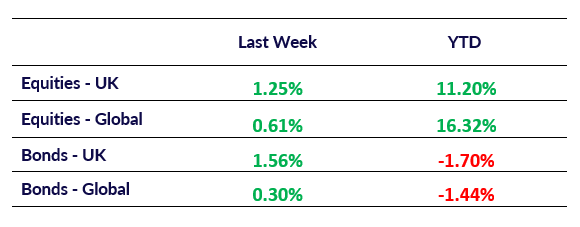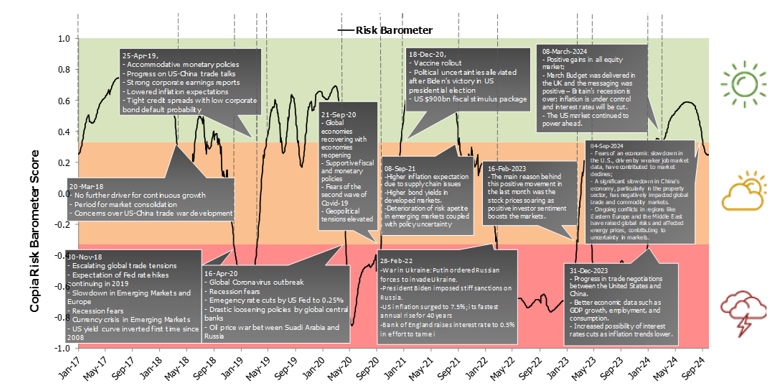The infoshot to help kick-start your week
Last Week
- China’s central bank took action to support markets as new data revealed the slowest economic growth in six quarters. The People’s Bank of China (PBOC) announced measures aimed at stabilizing capital markets shortly after the release of third-quarter data, highlighting the deepening slowdown. PBOC Governor Pan Gongsheng emphasized the challenges in the real estate and stock markets, signalling that these areas need targeted policy intervention. Despite a slower-than-expected 4.6% growth last quarter, stronger-than-anticipated September data suggest the economy may have bottomed out. Economists, like Jacqueline Rong from BNP Paribas, believe that China is likely to achieve its 2024 growth target of around 5%, provided there is a mild recovery in the fourth quarter. China’s stock markets reacted positively, with the CSI 300 Index rising by 3.6%, supported by a central bank re-lending facility aimed at share buybacks and President Xi Jinping’s push to meet economic targets and boost tech sectors.
- The risk of the euro falling to parity with the US dollar is rising in financial markets following a recent interest rate cut by the European Central Bank (ECB) and concerns about potential trade tensions under a Donald Trump presidency. After Trump hinted that US tariffs could target Europe, ECB President Christine Lagarde warned that such measures could pose a significant downside risk to the already fragile European economy. Lagarde’s decision to deliver a second consecutive interest rate cut has fuelled expectations of further reductions, sending the euro on a downward trajectory. The currency is heading for its third consecutive week of losses against the dollar. Experts like Michael Hart from Pictet Wealth Management now see euro-dollar parity as a real possibility, particularly if Trump escalates tariffs. Meanwhile, hedge funds and options traders have ramped up bearish bets, with euro sentiment turning increasingly negative according to recent data from the Commodity Futures Trading Commission.
- Goldman Sachs and Blackstone have collaborated to create a new type of bond, packaging private fund loans into asset-backed securities. Last week, they sold $475 million in bonds backed by loans that banks provide to investment funds, according to an insider. These loans help private equity and investment funds manage liquidity without requiring immediate capital calls from investors, which can enhance fund return metrics. Goldman Sachs bundled a group of these loans into asset-backed securities, with Blackstone purchasing the riskiest portion of the deal. This marks the first time such loans, known as capital call loans, have been packaged into publicly sold securities, creating a new bridge between private fund finance and the asset-backed securities market. Goldman’s head of US fund finance, Adam Zotkow, sees this securitization as a way to expand their lending capacity. While a new asset class, capital call loans have historically shown low credit risk, earning top ratings from agencies like DBRS Morningstar.
Market Pulse

Coming Up
- UK BofE Governor Bailey speech, Tuesday 22nd October 2024 at 2:45pm
- UK PMI data, Thursday 24th October 2024 at 9:30am
- US PMI Data, Thursday 24th October 2024 at 2:45pm

Notice:
For professional advisers only, Copia does not provide financial advice, and the contents of this document should not be taken as such. The performance of each asset class is represented by certain Exchange Traded Funds available to UK investors and expressed in GBP terms selected by Copia Capital Management to represent that asset class, as reported at previous Thursday 4:30pm UK close. Reference to a particular asset class does not represent a recommendation to seek exposure to that asset class. This information is included for comparison purposes for the period stated, but is not an indicator of potential maximum loss for other periods or in the future.Open document settingsOpen publish panel


